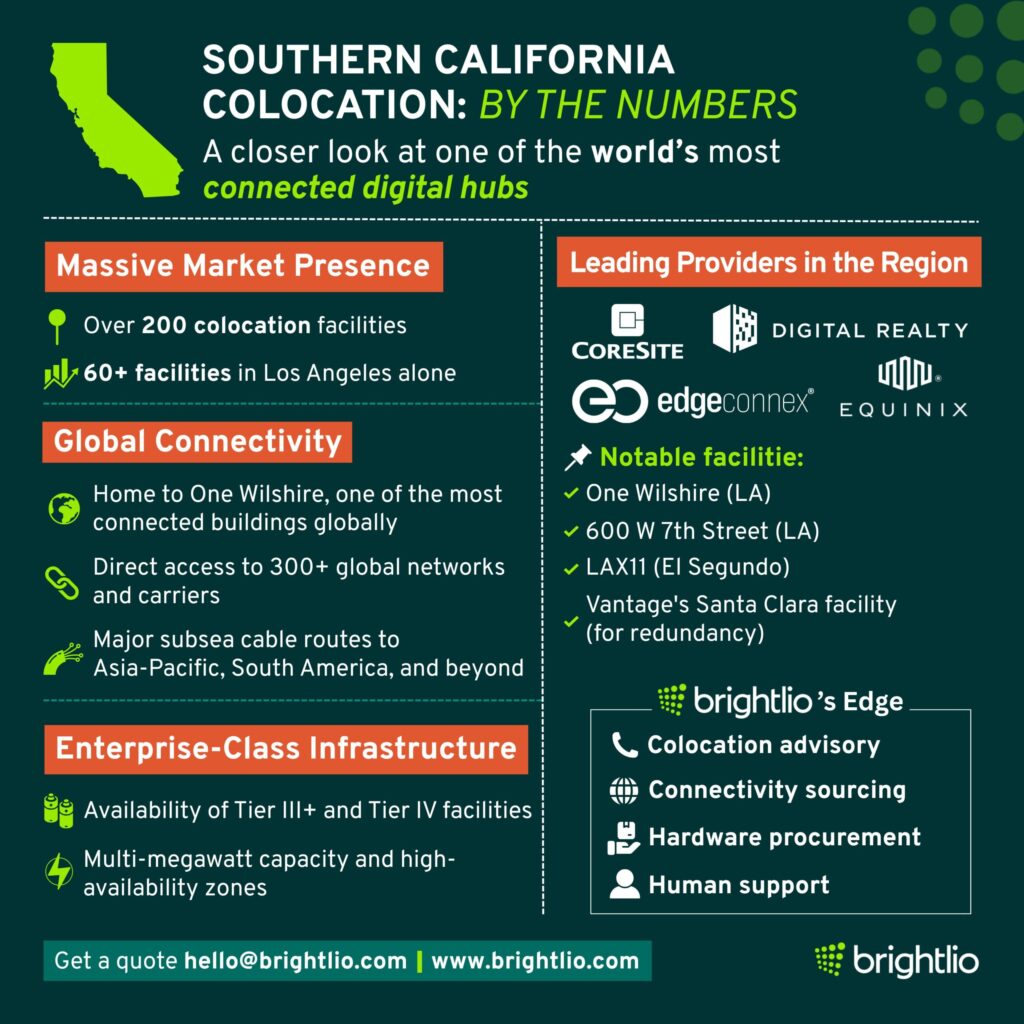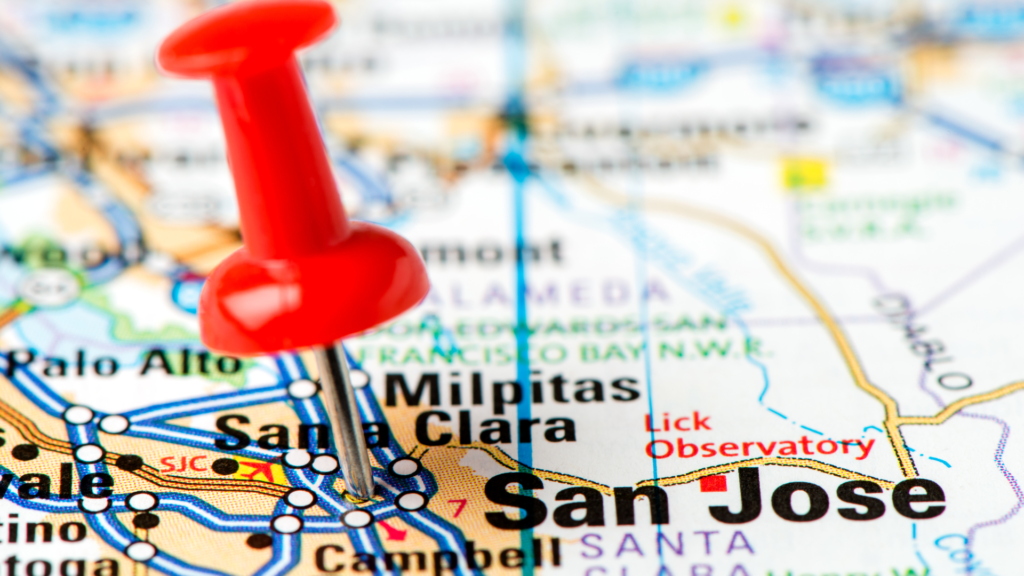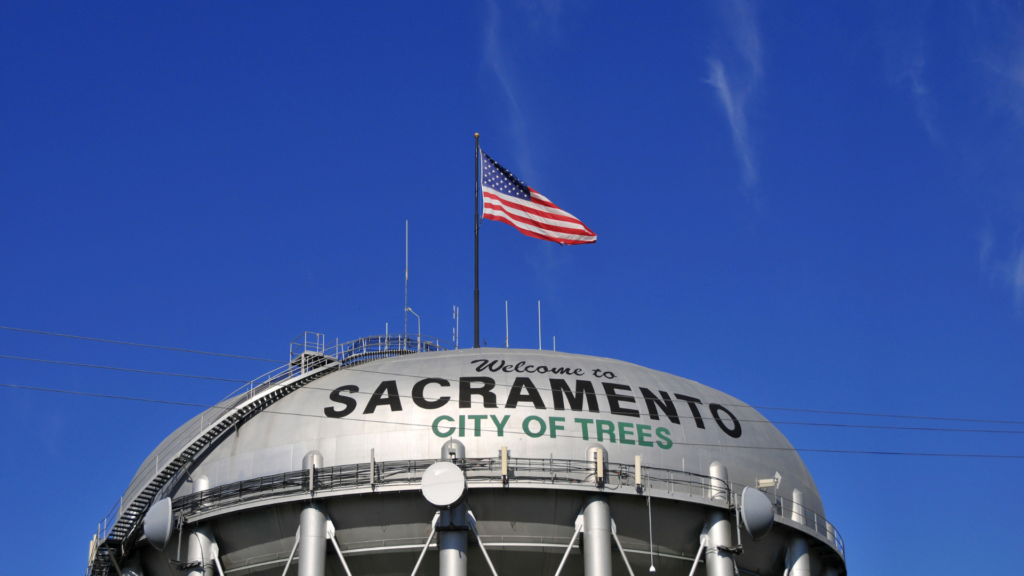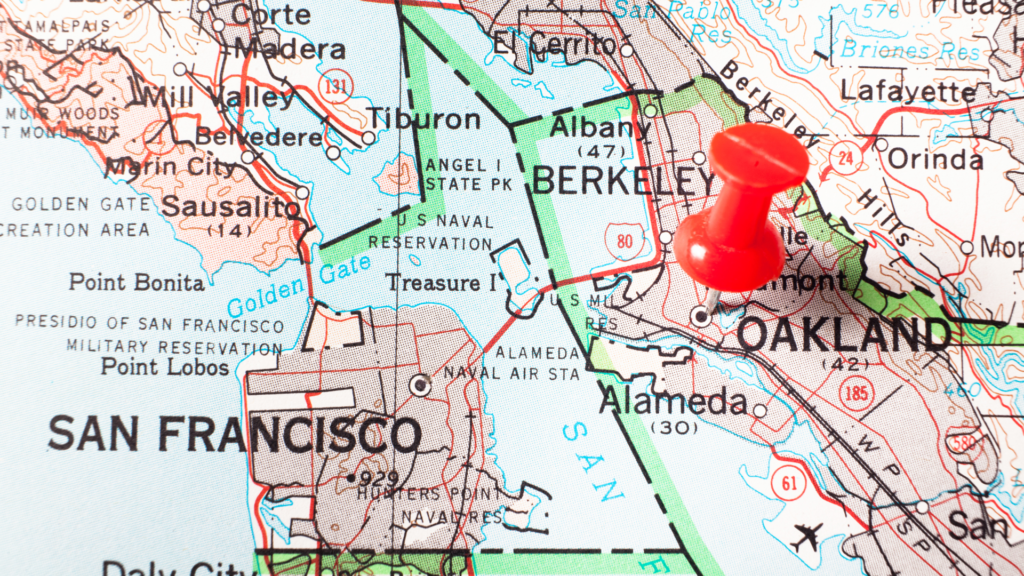
Table of Contents
California Data Centers
California has long been a global leader in information technology services. California is also one of the largest economies in the world. These and other factors drive an increasing demand for data centers in California.
In this article, we’ll explore the following:
- The significant reasons why California is an excellent location for colocation services
- The top data center markets in the state
- How Brightlio can help you pick the right colocation partner for your business
Let’s get started!

6 Reasons Why California Is a Great Location for Data Centers
Many factors make California an ideal location for data centers. Here are a few we’d like to spotlight.
California’s Economy is Huge
California’s economy continues to experience growth. In 2022, California’s Gross Domestic Product (GDP) was worth approximately $2.9 trillion at an annual growth rate of 2.4%. If California were a standalone country, the state’s GDP would rank as the 4th largest in the world, just behind the United States, Japan, and China. Locating your data center in California gives you proximity to a large potential customer base.
California is also home to many of the world’s largest tech companies, including Apple, Meta, Google, and Microsoft. Because the state has an accommodating business environment, data centers can conveniently serve a wide range of businesses and customers.
California Offers Many Data Centers
California has a thriving data center market that serves many global companies. More than 240 colocation facilities are spread across 25 cities within the state. Some popular data centers within the state include DataBank, Evocative, Evoque, CloudTrek, Cyxtera, Colocation America, and CoreSite.
California is also home to many tier-one data center markets in the United States. For example, global businesses consistently turn to Silicon Valley, Los Angeles, San Francisco, and San Diego for state-of-the-art data center solutions. Because of the state’s large data center market, customers needing colocation services can easily choose colocation facilities that match their budget and needs.

California Occupies a Strategic Location
Located along the Pacific Coast, California is a logical base for U.S. companies wanting to connect to businesses in Asia, Mexico, and Canada. It is also home to major cities like San Francisco, Los Angeles, and San Diego.
Other major U.S. markets with low latency connectivity to California cities include Las Vegas, Phoenix, Seattle, Portland, Denver, and Salt Lake City. If your business wants to serve customers within these locations, consider choosing a colocation partner within California.

California Has Excellent Network Connectivity
California has many fiber optic networks and service providers. All major public cloud providers offer availability zones within the state, including Amazon Web Services (AWS), Google Cloud, IBM Cloud, Oracle, Microsoft Azure, Alibaba, and Tencent.
Furthermore, many undersea internet cables run through California. This extensive network infrastructure allows data centers in the state to serve a wide range of customers from around the globe. These include:
- Pacific Light Cable Network (PLCN): This cable network connects Los Angeles to Hong Kong and the Philippines. Facebook, Google, and the Pacific Light Data Communication Co. Ltd jointly owns the infrastructure.
- Trans-Pacific Express (TPE): The TPE is an overseas cable from Los Angeles to Asia. It allows colocation facilities in California to connect with potential customers in global regions like China, Taiwan, and South Korea.
- America Asia Gateway (AAG): This overseas cable connects California to Southeast Asia. Consequently, data centers in California can leverage this network infrastructure to serve global customers in countries like Singapore, Hong Kong, and the Philippines.
- Curie: The Curie submarine cable connects Los Angeles to Valparaiso, Chile. Owned by Google, Curie has a capacity of 72 Tbps and is one of the significant internet connections between North and South America.
Data centers in California provide colocation facilities with a high level of connectivity, ensuring they can provide fast and reliable services to their customers.
California Has a Highly-Skilled Workforce
California is the most populous state in the U.S. and the third-largest by area. Because the state has a dense population and a growing economy, there is a high demand for data centers to serve the needs of businesses and individuals. The state is also home to many global universities that provide in-depth training in computer science, information technology, and data center management.
With over 39 million residents, data centers can easily access the workforce they need to run their businesses sustainably. Furthermore, many people immigrate to California from other parts of the U.S. and the world. As a result of this immigration, California has one of the highest migration rates in the country.
California Leads in Renewable Energy
California is a leader when it comes to renewable energy. That state’s government developed the Renewables Portfolio Standard (RPS) to increase the percentage of green energy sources in the state’s mix. California plans to reach 100% clean energy by 2045.
As such, the state harnesses alternative energy from sources like solar and wind to reduce its reliance on fossil fuels. Consequently, data centers in California can also take advantage of green energy initiatives to match their sustainability goals and save on electricity costs.
The California power grid is expected to experience tremendous growth. According to Cushman & Wakefield’s 2024 report, the market is expected to grow by 25,000 Megawatts. This represents the second largest growth in capacity for any US market after only Texas.

Top Data Center Markets in California
| Location | Data Centers | |
| 1 | Los Angeles | 72 |
| 2 | San Jose | 27 |
| 3 | San Francisco | 18 |
| 4 | Sacramento | 16 |
| 5 | San Diego | 13 |
| 6 | Irvine | 11 |
| 7 | Oakland | 2 |
| 8 | Fremont | 2 |
| Total | 161 |
Los Angeles
Los Angeles has been a thriving industry for data centers since the rise of the internet. As one of the most technologically developed cities in the U.S., Los Angeles and its neighboring suburbs rank among the country’s top ten data center markets. LA is home to many undersea internet cables that connect the U.S. to other major markets like Asia, South America, and Latin America.
This robust connectivity allows data centers in the city to serve a diverse range of customers without the fear of network downtimes. For example, In San Luis Obispo, the Grover Beach Cable Station is a crucial fiberoptic cable hub. This cable connects the U.S. to Japan via the PC-1 Network, which offers one of the highest reliability and lowest latency across the Pacific.
With a GDP of over $950 billion and a population of over 12 million people, Los Angeles is a great business environment for data centers.

Los Angeles Data Center Market Stats
- Market Size: Los Angeles has over 50 data centers and 47 location facilities with more than 200 MegaWatts (MW) of multi-commissioned power.
- Electricity Rates: Average electricity in LA costs around 25.7 cents per Kilowatt Hour (kWh) which is 57% more than the national average. As such, the city invests a lot in alternative energy sources to make electricity more affordable.
- Power Supply: Data centers in LA rely on green energy initiatives to reduce their power costs. In 2022, the Los Angeles Department of Water and Power (LADWP) generated over 55% of the city’s power from carbon-free sources. This alternative energy program makes it possible for data centers in Los Angeles to match their sustainability goals at an affordable rate.
- Network Connectivity: LA is often considered one of the most connected internet points in the western U.S. The city has over 260 internet providers and one of the world’s most populated meet-me rooms. In addition to its internet providers, LA has many connectivity hubs supported by Digital Realty. Rising Realty, and Equinix.
- Major Data Centers: One Wilshire Data Center, Cyxtera, Coresite, Zenlayer, Evocative, Evoque, DataBank.
- Cloud Providers: AWS, Microsoft Azure, Google Cloud, Oracle Cloud
Read more: Los Angeles Colocation: Leading the Way in Data Center Services
San Jose
San Jose is an excellent location for colocation in Northern California. The city is highly known for its favorable business environment and tax relief. Data centers in the region benefit from three broad economic programs:
- The Business Cooperation Program offers businesses a refund of up to 30% on the local portion of the state’s use tax. Colocation facilities can enjoy this break when they join the Use Tax Direct Pay Permit program or redirect their use tax to purchase construction materials in San José.
- San José’s Foreign Trade Zone allows data centers to delay, reduce, or avoid customs duties on imported goods. If goods are stored, produced, or assembled in the zone area, they are considered a part of international commerce.
- The city also provides the Industrial Development Bond program through the California Enterprise Development Authority. This program is available to manufacturers, who can use the low-cost bond proceeds to cover all expenses related to investing in tangible or intangible products.
Furthermore, the city is famous for being a vital internet interconnection point. For example, the CoreSite Data Center is an interconnection hub supporting many Silicon Valley high-tech companies. Because of its infrastructure, data centers and businesses in San Jose have access to fast network connections.

San Jose Data Center Market Stats
- Market Size: The city has over 27 colocation facilities that serve various local and international customers.
- Power Supply: The San José Clean Energy (SJCE) utility company is the largest electricity provider in the city. This not-for-profit company offers community programs that give customers more accessibility and transparency.
- Electricity Rates: San Jose’s electricity rates cost around 33 ¢/kWh. This figure is 11% higher than the California average and 44% higher than the national average. Despite this price point, data centers in San Jose use clean energy, like carbon-free solar farms, to reduce costs.
- Major Data Centers: CARI, Cogent, EdgeConnex, Lumen, and KIO Networks.
San Francisco
With a population of almost 850,000 people, San Francisco is one of the most extensive markets for data centers and service providers in the United States. The city attracts companies from different industries and is a high-tech innovation and development hub. Furthermore, San Francisco is strategically close to other data center markets like Oakland, Silicon Valley, San Jose, and Emeryville.
Over one-quarter of the region’s domestic workforce is employed in the technology sector. Because of its tech-savvy population, businesses in San Francisco can easily access the employees they need to keep their data centers running.

San Francisco Data Center Market Stats
- Market Size: San Francisco has over 17 data centers that businesses can easily choose from.
- Power Supply: The Pacific Gas & Electric Company (PG&E) is the primary utility company that supplies the region with electricity. Data centers and their customers rely on the city’s renewable energy to reduce their carbon footprint. The city’s government uses the Hetch Hetchy Power and CleanPowerSF programs to support its growing sustainability goal.
- Electricity Rates: Average electricity rates in San Francisco cost around 29 ¢/kWh.
- Major Data Centers: Digital Realty, Cyxtera, Colocation America, Hosting, and Lumen.
- Cloud providers: Alibaba Cloud, AWS, Oracle Cloud, Google Cloud, IBM Cloud, Microsoft Azure, and Tencent Cloud.
Sacramento
Sacramento, the capital of California, is regarded as a promising market for data centers in the United States. This growing industry has led to a highly competitive market that benefits businesses seeking colocation partners. Sacramento is located in Northern California, close to major global markets such as San Francisco and Silicon Valley.
Another factor that attracts data centers to Sacramento is its favorable weather profile. The city has a low earthquake and tornado index compared to other parts of California. Despite its low natural disaster profile, the city is still prone to flooding. The city’s government develops support policies to minimize flooding risks and provides businesses with flood maps.
Furthermore, data centers in Sacramento have access to affordable energy supplies. Over 55% of the region’s electricity comes from carbon-free sources. These alternative energies include natural gas, wind, solar, and hydropower. Consequently, Sacramento allows colocation facilities to match their sustainability goals without paying a premium.

Sacramento Data Center Market Stats
- Market Size: Sacramento has over 16 data centers businesses can choose from.
- Power Supply: The city’s sole electricity provider is the Sacramento Municipal Utility District (SMUD) company. With a grid capacity of 3,500 megawatts, the utility company uses the System Average Interruption Duration Index (SAIDI) to ensure data centers can access a reliable power supply. To reduce electricity costs, Sacramento provides monetary support to help colocation facilities pay for energy-saving technology.
- Electricity Rates: The average cost of electricity in the city is 15 cents/KWh, which is 50% lower than other parts of California and 34% lower than the country’s national average.
- Network Connectivity: Sacramento has many network providers that provide businesses with high-speed internet and fiber optic connections. Popular providers include Xfinity, AT&T fiber, Comcast, Consolidated Communications, and Verizon.
- Major Data Centers: QTS Sacramento Data Centers, Datacate Inc., 365 Data Centers, Prime Data Centers, Rancho Cordova Data Centers, and H5 Data Centers.
Read more: 7 Reasons Why You Should Colocate in Northern California
San Diego
There are many reasons why San Diego ranks among the top data center markets in California. The city is strategically close to other tier-one data center markets like Las Vegas, Phoenix, Salt Lake City, and Mexico. If you want to connect with customers in these places, San Diego data centers may be the right fit for your business.
Secondly, the city’s stable weather allows colocation facilities and customers to enjoy steady uptime. Compared to other California cities like San Francisco and Los Angeles, San Diego is 8.0 times less likely to experience an earthquake. This low earthquake index makes it the third safest city to locate your data center in California.

San Diego Data Center Market Stats
- Market Size: The city has 12 colocation facilities that support local and global businesses.
- Power Supply: The San Diego Gas & Electricity (SDG&E) company is the largest utility company in the city. More than 40% of the company’s power comes from renewable sources like natural gas, solar, and wind energy.
- Electricity Rates: The average electricity rate in this city costs around 38 ¢/kWh, which is 68% higher than the national average and 29% higher than other California cities. Data centers in San Diego rely on SDG&E’s renewable energy portfolio to meet their sustainability goals and save a fortune on power-related costs.
- Major Data Centers: Cogent, NFINIT, Lumen, SimpleNet Colo, and KIO Networks.
Read more: San Diego: An Ideal Location for Your Data Center
Irvine
Irvine has over 200,000 people and is the third-largest city in Orange county. Because it is strategically located between Los Angeles and San Diego, the city has a steady influx of businesses that want access to both markets. Irvine also has a business-friendly environment that makes it easy for data centers to thrive. For example, the city’s council provides a streamlined permitting process, low taxes, and a skilled workforce to help colocation facilities set up shop.
In addition to this, Irvine’s economic development agency consistently develops guides to help businesses invest in the city. Furthermore, data centers in Irvine enjoy stable weather compared to other parts of California. The city rarely experiences wildfires and flooding.
Although the region is prone to earthquakes, the office of emergency management provides assistance, protection, and guidelines to help data centers and their clients prepare for emergencies.
Irvine’s reliable network, strategic location, and business policies make the city an emerging market for colocation investments.

Irvine Data Center Market Stats
- Market Size: Irvine has over ten colocation facilities customers can choose from.
- Electricity Rate: The average electricity rate in Irvine is 32 ¢/kWh. This figure is 38% higher than the national average rate and 5% higher than other parts of California. To reduce electricity costs, the city of Irvine provides many alternative energy initiatives colocation facilities can take advantage of.
- For example, the Community Choice Energy (CCE) program, the Advanced Power and Energy Program (APEP), and the Strategic Energy Plan allow data centers to match their sustainability goals for a fraction of the initial cost.
- Power Supply: The sole provider for Irvine’s electricity supply is the SCE (Southern California Edison). The utility company is responsible for the city’s consistent power supply and reliable customer support.
- Network Connectivity: Irvine is home to many internet service providers that customers can choose from. Popular providers include Cox, AT&T, and Spectrum. Irvine is the first city in Orange county where businesses directly access low-latency internet connections from Google Fiber. Furthermore, many fiber companies use the city’s empty underground conduits to scale internet access and connectivity.
- Major Data Centers: Cyxtera, Data Bank, Cloudtrek, and Evoque
- Fiber Providers: Edison, Google Fiber, and Cox
Read more: 5 Reasons Why Irvine Is a Great Location for Data Centers
Oakland
Oakland’s data center market has become increasingly popular among customers needing retail colocation services. The city’s council is dedicated to providing data centers with the necessary services and resources to flourish.
For example, the city developed a Smart Lights Program to help data centers integrate energy-efficient methods into their daily operations. This program allows the center and its customers to save money on power-related costs.
Furthermore, Oakland is strategically located across the Bay from San Francisco Bay, one of the biggest technology hubs in the world. The area’s strategic location and weather profile makes it attractive to data centers looking to serve customers in the San Francisco Bay area. Moreover, data centers in Oakland are near several colocation communities like Berkley, Fremont, and Emeryville, all less than 30 miles away.

Oakland Data Center Market Stats
- Market Size: The city has over three primary data centers with more than 50 MW of commissioned power and 122,000 square feet of data center space.
- Power Supply: The East Bay Municipal Utility District company is the sole electricity provider in Oakland. The company supplies power from both renewable and fossil sources. What’s more, data centers in Oakland reduce their carbon footprint by relying on renewable sources like solar, wind, and biowaste.
- Electricity Rates: The average cost of electricity in Oakland is around 26 ¢/kWh, 12% less than the state’s average.
- Network Connectivity: Oakland has over 88% fiber availability and more than ten internet providers. The city’s well-established network structure provides low latency and fast connections. To improve the city’s internet presence, Oakland’s city council continues developing business strategies to enhance internet connectivity.
- Major Data Centers: Digital Realty, Evocative Data Centers, and 6×7 Networks
- Hyperscale/Cloud Providers: AT&T, Xfinity, T Home Internet, Earthlink, and Sonic
Read more: Oakland Data Centers: Colocation in the East Bay
Fremont
Fremont is the fourth-largest San Francisco Bay area city, with over 230,000 people. Because Fremont is home to many businesses, the city’s government runs multiple programs to help companies thrive. For example, the Economic Development Team renders direct services to help data centers handle real estate research, permitting assistance, and digital marketing.
Furthermore, Fremont is located in the heart of Silicon Valley, home to many of the world’s leading technology companies. This city’s location allows data centers to access talented workers easily, venture capital firms, and a thriving business ecosystem.

Fremont Data Center Market Stats
- Market Size: With 2 data centers, the Fremont colocation industry is still experiencing some growth.
- Power Supply: Two major energy providers supply Fremont with electricity: The Pacific Gas & Electric Company (PG&E) and The East Bay Community Energy (EBCE). Both companies provide clean energy at very affordable rates. In addition to energy supply, the PG&E oversees line maintenance, repair, billing, and payment of all power-relate tasks within the city.
- Electricity Rates: The average electricity rate in Fremont is 25 ¢/kWh, which is 17% lower than the California average and 8% higher than the national average. Colocation facilities in Fremont rely on the city’s green energy supply to save on power costs.
- Major Data Centers: Hurricane Fremont 1 and Hurricane Fremont 2
- Internet Providers: AT&T, Xfinity, T Home Internet, Earthlink, and HughesNet
El Segundo
Located in the South Bay of Los Angeles County, El Segundo is a thriving coastal city. Home to major defense, aerospace and oil companies, El Segundo is one of the most business-friendly cities in LA County.
El Segundo is located just south of Los Angeles International Airport, providing it close proximity to one of the busiest airports in the world. It is also close to the subsea internet cables in Manhattan Beach and Hermosa Beach. This provides data centers in El Segundo with low latency access to national and international internet pipes.
El Segundo Data Center Market Stats
- Market Size: El Segundo has five data centers: Two from Equinix, one from Evocative, one from Cyxtera, and one from Serverfarm.
- Digital Realty’s data center at 2260 E El Segundo Blvd is home to retail colocation from several providers.
- Serverfarm’s LAX1 data center was acquired from T5 Data Centers in 2021.
How Can Brightlio Help With Colocation in California?
At Brightlio, we help you find the right data center partner in California and other regions. With our global network of colocation partners, we provide customized colocation pricing that meets your specific requirements and budget.
We also offer a range of IT services, such as unified communication, network connectivity, and public cloud solutions, giving you a comprehensive technology solution for your business needs.
Contact our team today to get started!
If you enjoyed this article, we think you will like our guides to colocation in these states:
- Data Centers in Connecticut: Six Reasons to Colocate in the Constitution State
- Data Centers in Florida: Colocation in the Sunshine State
- The Iowa Data Center Market: Colocation In America’s Heartland
- The Ohio Data Center Advantage
- Data Centers in Massachusetts: Six Reasons to Colocate in the Bay State
- Data Centers in Maryland: Innovation in The Old Line State
- New Jersey Data Centers: Powering the Digital Future of the Garden State
- Data Centers in New York: The Gateway to Colocation in the Empire State
- Data Centers in Oregon: 5 Reasons to Colocate in the Pacific Northwest
- Data Centers in Texas: Colocation in the Lone Star State
- Data Centers in Northern Virginia: Brightlio’s Guide to Colocation in the Mid-Atlantic
Frequently Asked Questions
Why Do Companies Purchase Retail Colocation Services?
Retail colocation centers offer flexible, customizable solutions that allow companies to scale their IT infrastructure when needed. In addition, colocation facilities are usually more cost-effective than building and maintaining an in-house data center.
This is because the facilities can spread the cost of data center infrastructure across multiple customers, reducing the overall cost per customer.
How Are Colocation Services Priced?
The pricing of colocation services varies significantly depending on the customer’s specific needs. However, some key factors can affect the prices of colocation services in California and other regions:
- Space: Colocation providers charge customers for their IT equipment’s physical space within the data center. The price range is typically measured in racks or rack units (RU). The cost per RU can vary depending on the location and the provider.
- Power: Data centers charge customers for the energy their IT equipment consumes. Power consumption rates are typically measured on fixed kilowatts per hour (kW/h) or an agreed flat fee.
- Bandwidth: Customers often pay for the internet bandwidth consumed. Data consumption can be measured in Mbps or Gbps. A provider might include some bandwidth, like 100 Mbps, at no additional charge.
- Services: Some colocation providers offer additional services, such as managed services, remote hands, and equipment installation. Data centers charge each service separately, or customers pay a flat fee for a specific period.
Adetayo Sogbesan writes for Brightlio on data center, cloud, and network infrastructure topics, delivering insights that help businesses optimize technology strategies and understand industry trends.
Recent Posts
Data Centers In Alabama: Why You Must Colocate
10 Largest Underground Data Centers in the World
100+ VoIP Statistics from Credible Sources (Jan – 2026)
10 Largest Data Centres in the UK
Let's start
a new project together



